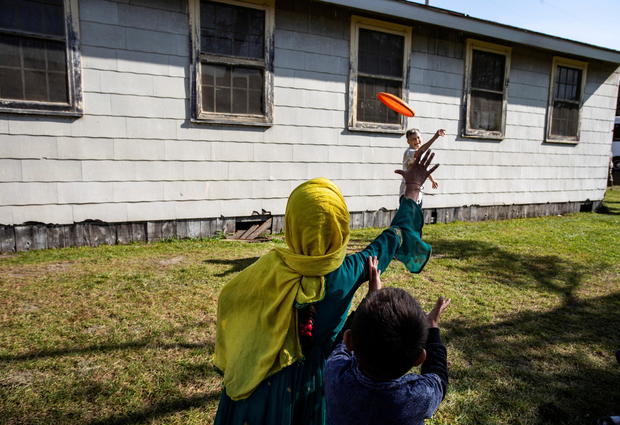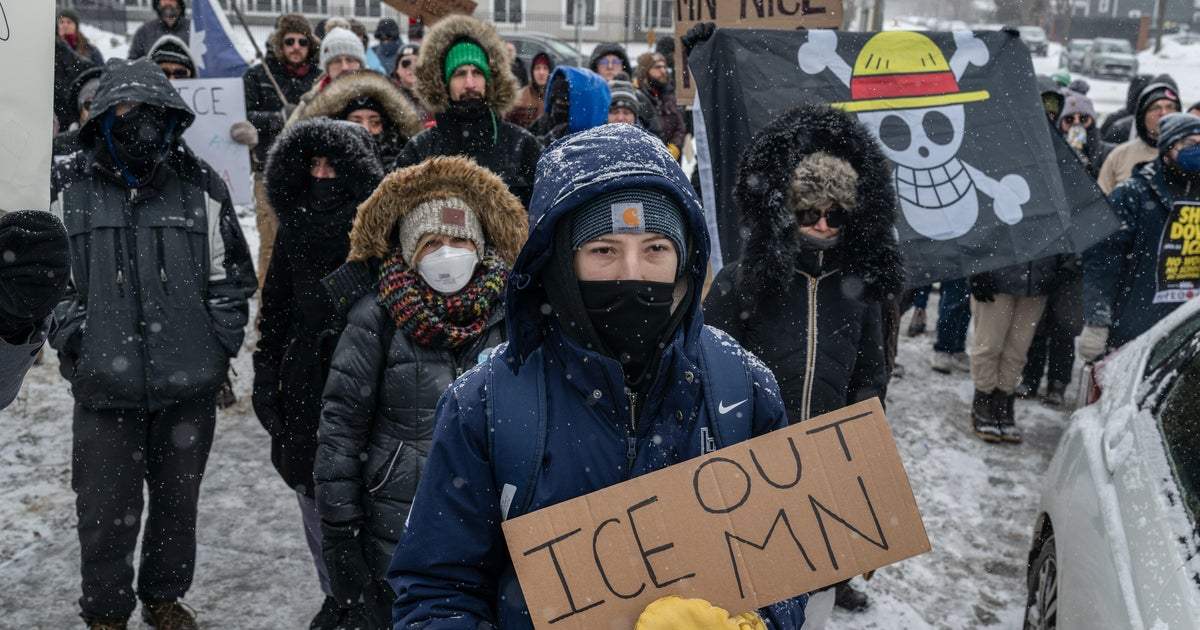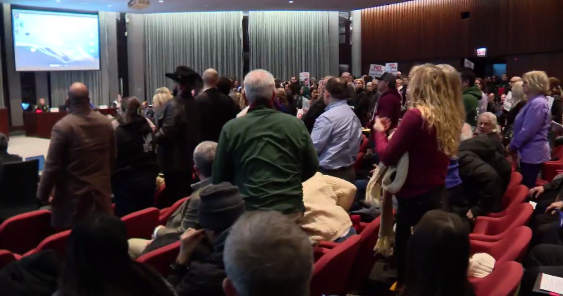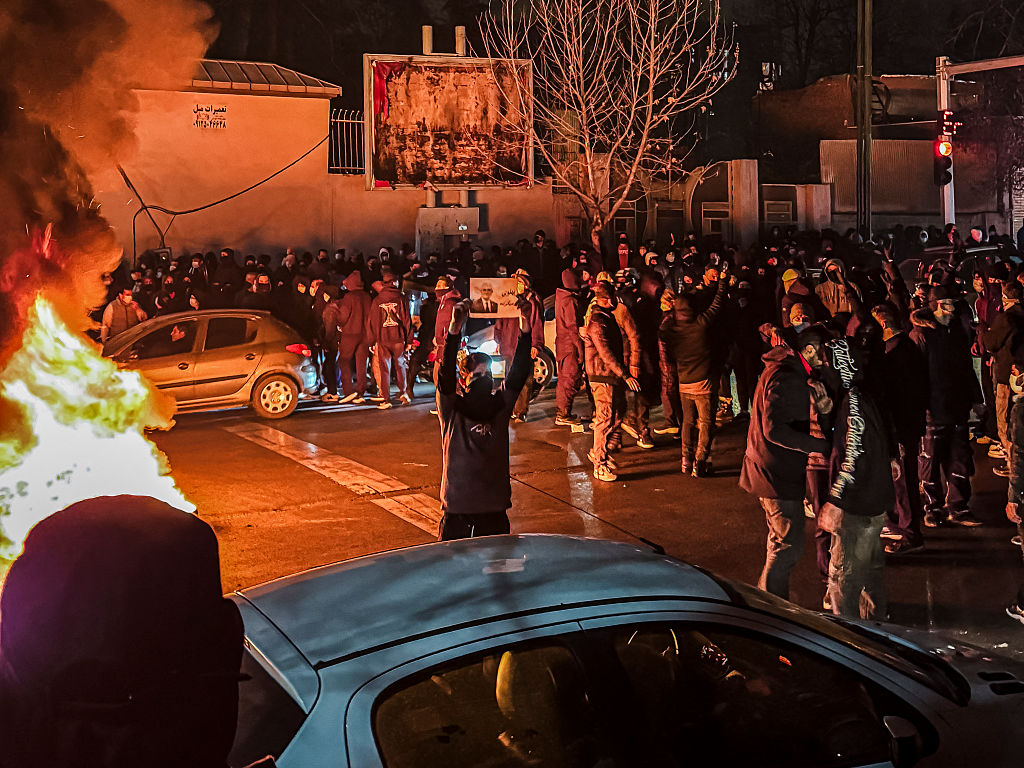Afghan evacuees start to leave U.S. military sites as part of new resettlement phase
The U.S. has begun discharging thousands of Afghan evacuees from military facilities and placing them in communities across the country as part of the new phase of a massive, nationwide resettlement effort, the latest government figures show.
In recent weeks, 6,000 Afghan evacuees have left temporary housing sites at U.S. military installations to start new lives in America with the help of nonprofit refugee resettlement agencies, according to Department of Homeland Security data. Another 3,000 U.S. citizens, green card holders and Afghans with close ties in America have left the facilities on their own.
Nearly 4,000 Afghan evacuees were resettled in U.S. communities during the past week alone.
More than 55,000 Afghans, half of them children, remain at eight U.S. military sites in Indiana, New Jersey, New Mexico, Virginia and Wisconsin. Another 5,000 evacuees housed at overseas military bases are waiting to be placed on U.S.-bound flights, according to the DHS statistics.
The pace of relocations from the military sites has ramped up in recent days after the U.S. completed a campaign to vaccinate evacuees against COVID-19 and other diseases. The number of arrivals has also increased after the U.S. lifted a three-week pause on evacuation flights earlier this month.
More than 10,000 evacuees have arrived in the U.S. since the flights resumed, bringing the total number of people relocated since mid-August to more than 75,000, DHS figures show. Roughly 89% of the evacuees are Afghans, while the rest are U.S. citizens or green card holders.
Before the mass evacuations started in August, the U.S. government relocated thousands of Afghans who were determined to be eligible for Special Immigrant Visas because of their assistance to American military forces.
A senior Biden administration official, who requested anonymity to speak freely, said the government is working to process evacuees as quickly as possible, while making case-by-case decisions on which U.S. communities can receive them.
"It's not easy to move large groups. Our overall goal is to get the balance right here," the official told CBS News. "We certainly could just move people to a big housing facility somewhere. But we're really keen to move people to their final resettlement destination and a place that meets the needs of their family."
Resettlement officials said a major hurdle in getting Afghans out of the military bases more expeditiously is the limited housing in U.S. communities where many of evacuees have family ties, including northern California and the Dallas, Houston and Washington, D.C., suburbs.
"The bottom line is that housing is and will remain a major stumbling block, especially in these preferred destinations," Erol Kekic, a senior vice president at Church World Service, one of the nine national resettlement agencies, told CBS News.
The administration official acknowledged the housing shortage, saying the government is encouraging evacuees to move to states like Oklahoma, which has offered to subsidize their housing for more than a year. The state is set to host the third-largest number of Afghan arrivals during the first resettlement phase.
The administration has also allowed resettlement groups to place Afghans with family members living in the U.S. and outside the typical 100-mile radius limit from a local resettlement office, the official noted. It is also working to identify short-term housing options in popular destinations.
"It's not ideal to not put people in their final homes right from the very beginning. But in some of these areas where it's busier, I think it's probably better to get them at least off the bases, into some kind of housing. Their kids can be registered in their ultimate school, etcetera," the official said.
Before boarding flights to the U.S, Afghans have been subjected to biometric and biographic security screenings conducted by multiple law enforcement and intelligence agencies, including DHS and the FBI.
Flights of Afghan evacuees were suspended in September after several cases of measles were identified among the new arrivals. Before lifting the suspension in early October, the U.S. vaccinated 49,000 Afghans at the military sites against measles, mumps, rubella and varicella.
Under the terms of their entry into the U.S., Afghan evacuees are also legally required to receive vaccines against polio and COVID-19. As of October 15, approximately 98% of the evacuees had received at least one dose of a coronavirus vaccine, according to DHS data.
As part of a pilot program, personnel at the military sites have been asking evacuated Afghans about their skills and education and whether they speak English. Officials are then including their information in a database that prospective employers can use to hire them, the senior Biden administration official said.
At the military facilities, adult evacuees have access to English classes and children are receiving ad hoc educational services, the administration official said. Evacuated Afghans are also getting help filing immigration paperwork, including applications for asylum and Special Immigrant Visas, the official added.
The Biden administration has determined that at least 50% of the at-risk Afghans relocated to the U.S. are eligible for Special Immigrant Visas because they aided American forces during the 20-year war in Afghanistan, according to the DHS. Special visa holders become permanent U.S. residents.
Those who do not qualify for the special visas — like journalists, activists and humanitarian aid workers — don't have a pathway to secure permanent U.S. legal status. Unless Congress legalizes them, they will likely have to seek U.S. status though the backlogged asylum system.
Many Afghans evacuated to the U.S. have family members in Afghanistan or in neighboring countries like Pakistan whom they believe could be harmed by the Taliban. Refugee advocates have urged the administration to set up a process for these individuals to request U.S. resettlement.
The senior Biden administration official said the government will try to make parole — a humanitarian process that authorizes the entry of immigrants without visas — available to certain Afghans overseas, particularly immediate family members of evacuees in the U.S.
"Family reunification for children with parents is always going to be an immediate priority," the official said. "That is one thing we're looking at parole for."
According to internal notices sent this month, U.S. Citizenship and Immigration Services employees have been asked to volunteer to help process "an increasing number of requests for parole for Afghan nationals outside the United States."
Eleanor Watson contributed to this report.








